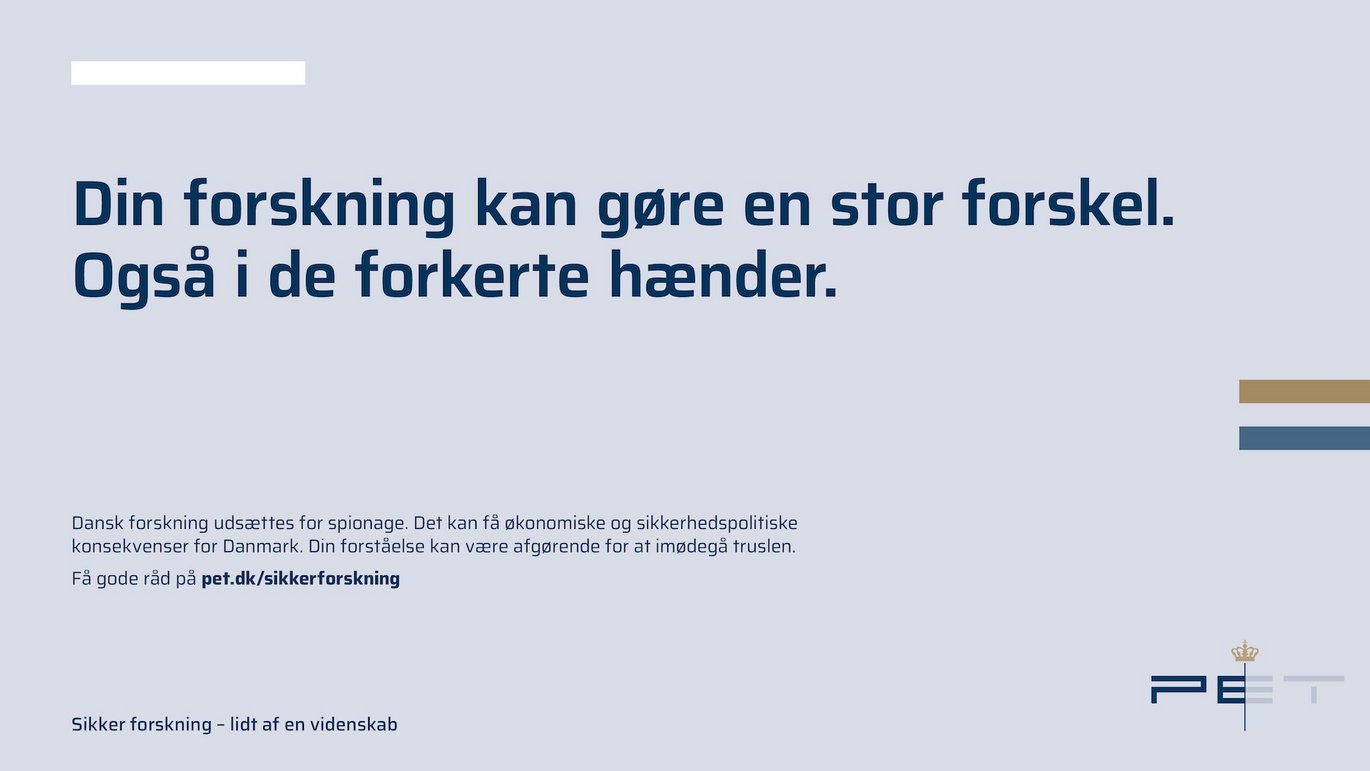The Danish national security agency PET launches campaign for research security
With ironic messages on posters, PET is pushing to make researchers even more aware of the very real threat of espionage from adversary states. PET's campaign is followed by initiatives at Aarhus University.

About URIS and the campaign
- URIS is an abbreviation for ‘Udvalg om retningslinjer for internationalt forsknings- og innovationssamarbejde’, which translates as ‘committee on guidelines for international research and innovation collaboration’. In 2022, the committee published a report detailing its recommendations and guidelines for safeguarding Danish research against financial, security and ethical risks in research and innovation collaborations.
- The URIS guidelines will be presented and introduced gradually starting in spring 2024. The first guidelines will cover procedures for hiring researchers from critical countries, among other topics.
- In parallel, work is also being done to continuously increase cybersecurity and minimise the risk of data leaks in research more generally.
- In the cross-sectional working group at Aarhus University, among others, all vice-deans for research and scientific staff from each faculty are included – half of the VIP representatives must be department heads. Per Höllsberg and Siri Beier Jensen are Health's representatives on the committee.
- The information campaign "Knowledge security – a science in itself" has been initiated by the Danish Security and Intelligence Service. Learn more at https://pet.dk/sikkerforskning
“Avoid becoming employee of the year in the Russian intelligence service.”
This is one of the campaign messages in the Danish Intelligence Service's new information campaign, "Knowledge security – a science in itself", which raises the alarm about the increasing foreign spy threat at Danish universities.
Although the messages are delivered with humour, there’s nothing funny about the content. Therefore, the campaign is welcomed by Aarhus University, says Brian Vinter, who is vice-dean for research at the Faculty of Technical Sciences and chair of AU’s implementation of guidelines for international research and innovation collaboration, the campaign couldn’t have come at a better time (URIS):
“We find ourselves in a security policy situation with a new risk landscape. There are adversary states attempting to intercept knowledge and technology based on Danish research, and what’s complex is that we’re also interested in collaborating with universities and researchers in these countries.”
The threat is real – also at Health
In the cross-sectional working group URIS, Health is represented by the Vice-Dean for Research, Per Höllsberg, and the Department Head at the Department of Dentistry and Oral Health (IOOS), Siri Beier Jensen. The two representatives have no doubts that the PET campaign and the increased focus on research security are both important and necessary also at Health.
According to Siri Beier Jensen, the espionage threat extends beyond the work at the university itself.
"As a researcher at Health, one might think, what interest does my little corner of health science possibly have for China or Russia? But for adversary states, a credible institution like the university can also be a backdoor in and a way to establish themselves in our society. They have plenty of resources and a lot of patience. There can be more at stake than research data and technology, although that is serious enough in itself. We are the first bastion against the espionage threat," says Siri Beier Jensen.
Aarhus University to adopt own research security guidelines
The URIS working group at Aarhus Universitet is responsible for the implementation of guidelines for international research and innovation collaboration. The group is in the process of drafting the guidelines, which will increase focus on security at virtually all stages of research, from hiring colleagues and using PCs and phones while travelling to procedures connected with terminating an employment contract. To name just a few examples.
"PET's campaign marks the onset of the effort we are rolling out at Aarhus University starting this spring and gradually will implement over the next two years. It will affect all employees, but especially those researchers who collaborate with colleagues from Russia, China, and Iran. We must be vigilant without being suspicious," says Per Höllsberg.
PET campaign can kickstart important conversations in research environments
He hopes that PET's campaign will help researchers navigate the new reality – to begin with, by getting them to think twice and start discussing the campaign’s core messages.
"In a democracy like ours, we have a trust-based approach to the world, and we fundamentally believe the best about others' intentions. At the same time, we must also acknowledge that we have probably been naive. The espionage threat against Danish universities is concrete and has been for a long time, and therefore the PET campaign is a good starting point for initiating the important conversations in research environments about security in research and collaboration with risk countries, which we will continue in the future," says Per Höllsberg.
Download posters from PET's information campaign: "Secure research – a science in itself."